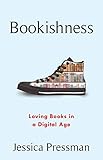Bookishness : Loving Books in a Digital Age / Jessica Pressman.
Material type: TextSeries: Literature NowPublisher: New York, NY : Columbia University Press, [2021]Copyright date: ©2020Description: 1 online resourceContent type:
TextSeries: Literature NowPublisher: New York, NY : Columbia University Press, [2021]Copyright date: ©2020Description: 1 online resourceContent type: - 9780231551199
- Z116.A2 P87 2020
- online - DeGruyter
| Item type | Current library | Call number | URL | Status | Notes | Barcode | |
|---|---|---|---|---|---|---|---|
 eBook
eBook
|
Biblioteca "Angelicum" Pont. Univ. S.Tommaso d'Aquino Nuvola online | online - DeGruyter (Browse shelf(Opens below)) | Online access | Not for loan (Accesso limitato) | Accesso per gli utenti autorizzati / Access for authorized users | (dgr)9780231551199 |
Browsing Biblioteca "Angelicum" Pont. Univ. S.Tommaso d'Aquino shelves, Shelving location: Nuvola online Close shelf browser (Hides shelf browser)

|

|

|

|

|

|

|
||
| online - DeGruyter The Self-Help Compulsion : Searching for Advice in Modern Literature / | online - DeGruyter Sexuality : The 1964 Clermont-Ferrand and 1969 Vincennes Lectures. | online - DeGruyter Peace on Our Terms : The Global Battle for Women's Rights After the First World War / | online - DeGruyter Bookishness : Loving Books in a Digital Age / | online - DeGruyter Roman Catholicism in America / | online - DeGruyter At War with Government : How Conservatives Weaponized Distrust from Goldwater to Trump / | online - DeGruyter Voices from the Chinese Century : Public Intellectual Debate from Contemporary China / |
Frontmatter -- Contents -- Illustrations -- Aknowledgements -- Introduction -- 1 How and now Bookishness -- 2 Shelter -- 3 Thing -- 4 Fake -- 5 Weapon -- 6 Memorial -- Coda -- Notes -- Index
restricted access online access with authorization star
http://purl.org/coar/access_right/c_16ec
Twenty-first-century culture is obsessed with books. In a time when many voices have joined to predict the death of print, books continue to resurface in new and unexpected ways. From the proliferation of “shelfies” to Jane Austen–themed leggings and from decorative pillows printed with beloved book covers to bookwork sculptures exhibited in prestigious collections, books are everywhere and are not just for reading. Writers have caught up with this trend: many contemporary novels depict books as central characters or fetishize paper and print thematically and formally.In Bookishness, Jessica Pressman examines the new status of the book as object and symbol. She explores the rise of “bookishness” as an identity and an aesthetic strategy that proliferates from store-window décor to experimental writing. Ranging from literature to kitsch objects, stop-motion animation films to book design, Pressman considers the multivalent meanings of books in contemporary culture. Books can represent shelter from—or a weapon against—the dangers of the digital; they can act as memorials and express a sense of loss. Examining the works of writers such as Jonathan Safran Foer, Jennifer Egan, Mark Z. Danielewski, and Leanne Shapton, Pressman illuminates the status of the book as a fetish object and its significance for understanding contemporary fakery. Bringing together media studies, book history, and literary criticism, Bookishness explains how books still give meaning to our lives in a digital age.
Mode of access: Internet via World Wide Web.
In English.
Description based on online resource; title from PDF title page (publisher's Web site, viewed 27. Jan 2023)


